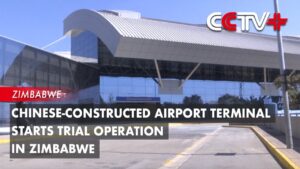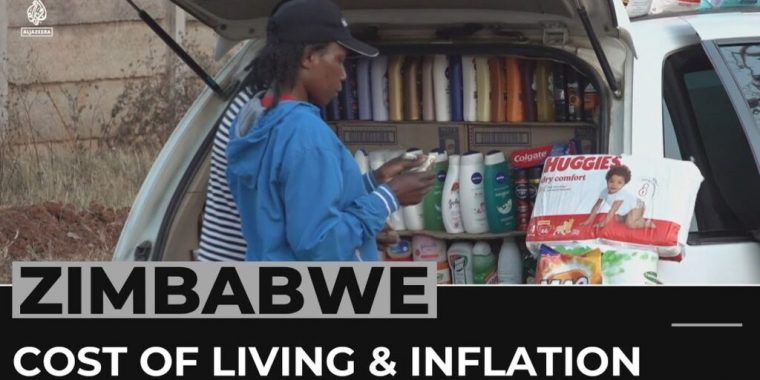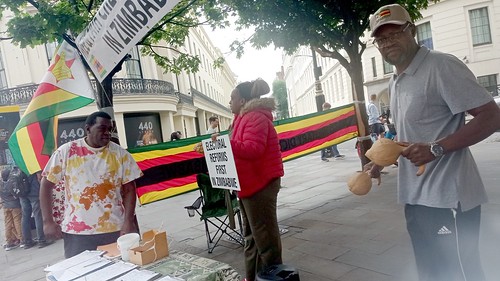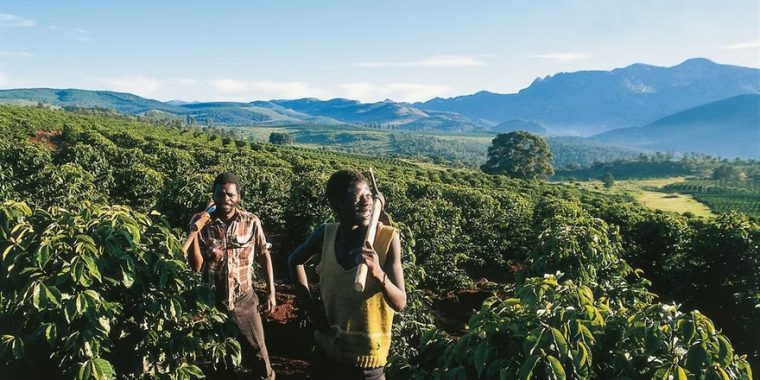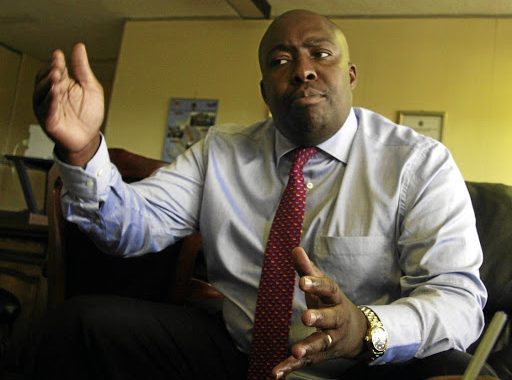Nespresso
is
supporting
small
coffee
bean
farmers
as
part
of
the
government’s
plan
to
revive
the
once
flourishing
industry. Deagostini
/
Alamy
Stock
Photo
Twenty-three
years
ago,
forced
evictions
of
white
coffee
farmers
from
Zimbabwe
led
to
the
collapse
of
the
industry.
Today
coffee
production
is
on
the
rise,
with
the
support
of
Nestlé’s
Nespresso
brand,
but
it
is
still
a
fraction
of
what
it
used
to
be.
David
Muganyura,
a
veteran
coffee
farmer,
joined
a
Nespresso
initiative
that
seeks
to
revive
growing
of
the
crop
at
its
launch
in
2019.
He
has
not
looked
back
since.
The
74-year-old
who
had
been
farming
the
bean
since
1984
saw
his
output
and
profitability
collapse
to
near
zero
by
forced
evictions
of
the
main
coffee
growers
of
the
country
back
in
2000.
This
led
to
a
decline
in
export
demand
for
the
locally
grown
crop.
In
2000,
the
price
of
the
crop
dropped
to
as
low
as
$0.20
(CHF0.18)
per
kilogram.

Coffee
farmer
David
Muganyura
and
his
wife
Fatima
Matimbe
on
their
coffee
plantation
in
the
Honde
Valley
in
eastern
Zimbabwe. Daisy
Jeremani
So
when
Nestlé
introduced
its
Tamuka
MuZimbabwe
programme
(indigenous
Shona
language
for
“we
have
awakened
in
Zimbabwe”)
to
reboot
coffee
growing,
he
was
among
the
first
to
sign
on.
The
programme
included
a
training
run
by
Lausanne-based
coffee
giant
Nespresso,
owned
by
Nestlé,
through
a
local
initiative
called
TechnoServe
in
2018.
It
also
included
the
Swiss
company
buying
his
coffee
beans
at
a
producer
price
of
about
$8
per
kilogram.
This
is
almost
double
what
local buyers,
such
as
Cairns
Foods
and
Grain
Marketing
Board
pay
for
the
crop.
Muganyura
was
among
the
first
locals
to
plant
the
coffee
seeds
under
the
initiative
a
year
later.
He
doubled
output
to
about
1,500
kg
in
that
first
year,
earning
approximately
$10,000.
The
average
salary
in
Zimbabwe
was
$220
a
month
in
2022.

Coffee
laid
out
to
dry. Daisy
Jeremani
“We
have,
through
the
proceeds
we
get
from
the
partnership,
invested
in
other
farming
projects,
been
able
to
pay
for
health
care
for
their
family,
repay
loans
for
inputs
and
paying
farm
workers. We
have
also
settled
the
debts
we
had
at
Zimbabwe
Coffee
Mill
[where
coffee
beans
are
processed],” he
told
SWI
swissinfo.ch.
The
Nespresso
initiative
falls
under
the
company’s
bigger
agenda,
AAA
Sustainable
Quality
programme
which
aims
to
revive
high
quality
coffee
production
in
different
regions
of
the
world
where
production
has
been
affected
by
conflict,
economic
or
environmental
disasters.
These
include
Colombia,
Puerto
Rico,
Cuba,
Uganda
and
the
Democratic
Republic
of
the
Congo.
It
seeks
to
establish
long-term
partnerships
with
farmers
and
communities
to
rebuild
sustainable
coffee
production.
In
Zimbabwe,
Nespresso
partnered
with
an
American
non-governmental
organisation,
TechnoServe,
two
local
coffee
bean
farms
and
about
450
smallholder
farmers
in
Honde
Valley. The
area
that
stretches
into
neighbouring
Mozambique is
best
suited
for
growing
Arabica
coffee,
a
high-quality
bean
known
to
contain
less
caffeine
and
for
its
smoother
taste
than
the
cheaper
Robusta
bean.
Nespresso
says
since
2016
it
has
invested
CHF39million
(about
$42million)
into
the
Reviving
Origins
global
programme
through
its
funding
vehicle
called
the
Nespresso
Sustainability
Innovation
Fund.
It
did
not
say
how
much
it
had
invested
in
Zimbabwe.
In
October
2022,
it
announced
an
additional
investment
of
$
4.5
million
into
Reviving
Origins
in
Africa.
Rising
from
the
ashes
Nespresso’s
initiative
is
part
of
a
larger
plan
by
the
Zimbabwe
government
to
revive
its
once
flourishing
coffee
industry
decimated
from
2000
onwards
when
Robert
Mugabe,
then
Zimbabwe’s
president,
authorised
evictions
of
the
up
to
4,000
large-scale
white
farmers
from
about
11
million
hectares
across
the
country.
Among
the
displaced
were
local
coffee
producers. Until
the
early
2000s,
the
country
was
among
the
top
30
growing
nations
globally,
producing
an
average
15,000
tonnes
of
the
crop
yearly. Now
annual
output
averages
500
tonnes
from
two
commercial
estates
and
some
450
small farms
of
around
2
hectares,
like
Muganyura’s
plantation.
By
2019,
smallholder
coffee
farming
had
essentially
collapsed,
as
most
black farmers
opted
for
better
paying
cash crops
such
as
macadamia
nuts.
In
2018,
the
government
launched
a
strategy
which
seeks
to
boost
coffee
output
to
10,000
tonnes
by
2024. The
plan
will
require
an
investment
of
$60
million
spread
over
five
years
to
maintain
existing
coffee
farms
and establish
4,700
hectares
of
new
plantations.
The
government
also
hopes
to
establish
a
sustainable
funding
model
for
the
crop.
A
government
agronomist
for
Mutasa
District,
Abraham
Mutsenura,
says
the
situation
for
smallholders
is
now
improving
with
more
farmers
growing
coffee
again.
But
he
adds,
the
industry
can
still
improve
both
the
quality
and
quantity
of
the
beans.
Annual
production
is
still
only
a
fraction
of
what
it
used
to
be.
The
government
now
prefers
to
push
crops
that
are
deemed
as
more
strategic
such
as
maize,
corn
or
soy.
With
no
proper
government
support,
challenges
remain
for
farmers.
The development
of
the
region
is
dependent
on
Nespresso.
There
is
no
other
local
initiative.
“The
Nespresso
initiative
has
resulted
in
some
positive
changes
to
their
farming
ventures,
but
there
is
a
need
for
constant
reviewing
of
the
market
price
of
the
bean
to
match
the
cost
of
production,”
he
says.
The
cost
of
chemicals
and
fertilisers
rise
every
season;
for
example
a
bag
of
ammonium
nitrate
cost
$94
in
2022
against
$55
in
2021.
More
Why
Switzerland
needs
workers
from
abroad
Switzerland
is
an
attractive
place
to
work
and
the
country
needs
specialists.
But
work
permits
can
be
hard
to
come
by.
Muganyura
adds
that
in
his
view
Nespresso
can
do
more
to
support
local
farming,
including
further
incentives
to
boost
the
size
of
the
land
farmed.
This
would
include
providing
farmers
with
more
resources
such
as
seeds
and
fertilisers.
He
also
stressed
the
importance
of
investing
in
irrigation
systems
in
the
country’s
main
coffee-growing
districts.

Coffee
farmer
David
Muganyuri
working
on
his
farm
in
the
Honde
Valley
in
eastern
Zimbabwe. Daisy
Jeremani
“A
strong
market
and
supply
relationship
is
key
for
the
mutual
sustainability
in
the
medium-
to
long-term
journey
(between)
Nespresso
and
TechnoServe
(and)
smallholder
farmers,”
he
says.
Nespresso
SA
global
public
relations
manager Delphine
Bourseau
acknowledged
that
the
initiative
has
to
contend
with
some
risks.
Reviving
Origins
is
a
long-term
programme
which
aims
to
overcome
diverse
local
challenges
which
previously
affected
coffee
production,
she
says.
“Each
area
has
been
chosen
specifically
because
it
was
under
environmental,
social
or
economic
factors
that
have
caused
a
drastic
reduction
of
production
of
coffee
in
the
area,”
she
tells
SWI
swissinfo.ch.
“As
a
result
of
the
differing
circumstances
affecting
these
communities,
each
Reviving
Origins
coffees
require
a
bespoke
approach,
and
we
focus
on
investing
in
a
smaller
number
of
communities
over
a
longer
period.
However,
due
to
the
complexity
of
these
projects
it
can
be
challenging
to
guarantee
exactly
when
and
what
the
results
will
be.”
Adding
to
farmers’
uncertainty
is
the
legal
obligation
for
them
to
cede
a
certain
percentage
of
their
earnings
to
the
Reserve
Bank
of
Zimbabwe. In
2019
and
2020
the
government
collected
20%
of
farmers’
proceeds.
In
2022 the
threshold
was
increased
to
40%. After
backlash
from
farmers
the
percentage
could
be
cut
to
25%
for
2023.

Coffee
bean
plant. Daisy
Jeremani
Edward
Dune,
former
vice
president
of
the
Zimbabwe
National
Farmers’
Union
sees
no
problem
with
the
government
not
supporting
the
production
of
coffee,
as
it
does
the
other
crops.
Coffee
farmers,
he
says,
have
the
option
of
accessing
commercial
loans
from
financial
institutions.
He
also
suggests
Nespresso
could
play
a
more
pivotal
role.
“The
government’s
role
is
basically
policy
development
and
if
they
have
done
something
towards
strategy,
the
improvement
of
productivity
along
the
value
chain,
then
they
have
done
more
than
enough,”
he
says.
Caleb
Mahoya,
head
of
the
Coffee
Research
Institute
based
in
the
southeastern
town
of
Chipinge,
told
SWI
swissinfo.ch
that
the
government
is
implementing
the
plan.
But
it’s
still
too
early
to
say
whether
its
growth
projections
will
be
met.
“We
will
only
be
clear
after
this
and
next
season
to
see
if
we
are
able
to
meet
that
target,”
he
says.
“We
have
new
farmers
each
and
every
year
and
they
will
add
to
the
achievement
of
this
target.”
–
SWI
swissinfo.ch
Post
published
in:
Agriculture


